Managing New Product Development and Innovation A Microeconomics Toolbox
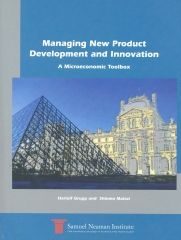
Comprising over a decade of research the fifteen chapters in this book offer a selection of practical microeconomic tools for managing new product development and innovation. An overall theme unites these tools feature-based innovation. By quantifying product features and evaluating the costs and market value of improving each , a simple yet powerful conceptual framework […]
R&D Policy in Israel: An Overview and Reassessment, Science, Technology and the Economy Program STE-WP-2
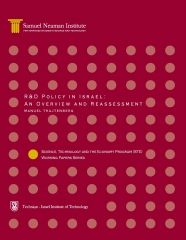
The goal of this paper is to provide an overview of R&D policy in Israel, and critically examine the policies currently in place as well as proposals to change them. We review in Part I the various programs of the Office of the Chief Scientist (OCS) of the Ministry of Industry and Trade in Israel, […]
Do R&D Subsidies Stimulate or Displace Private R&D? Evidence from Israel, Science, Technology and the Economy Program (STE) – Working Papers Series STE-WP-1
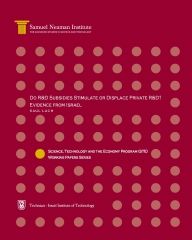
In evaluating the effect of an R&D subsidy we need to know what the subsidized firm would have spent on R&D had it not received the subsidy Using data on Israeli manufacturing firms in the 1990s we find evidence suggesting that the R&D subsidies granted by the Ministry of Industry and Trade stimulated long-run company-financed […]
Innovation in Israel 1968-1997: A Comparative Analysis using Patent Data, Science, Technology and the Economy Program STE-WP-5
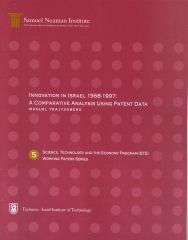
The Israeli high tech sector is widely regarded as a hotbed of cutting-edge technologies, and as the growth engine of the Israeli economy in the nineties and beyond. In this paper we present a close-up portrait of innovation in Israel for the past 30 years, with the aid of highly detailed patent data. We use […]
University Technology Transfer in Israel: Evaluation of Projects and Determinants of Success – SNI R&D Policy Papers Series
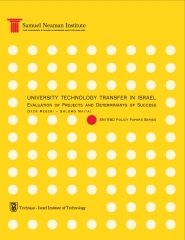
The purpose of this study is to examine how technology transfer organizations (TTOs) at Israeli universities evaluate projects and how they perceive the success or failure of these projects once they are selected. We also analyze whether the criteria they use are similar to those employed by venture capitalists and MIT. We find that the […]
The Contribution of Science to Israeli Security
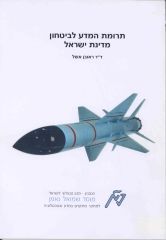
This survey was commission by President of the Technion, Professor Zehev Tadmor, as part of a series of surveys on the contributions of science to the State of Israel on its 50th anniversary. The project was initiated by the Israel Academy of Sciences and Humanities. Even before the establishment of the State of Israel the […]
The Contribution of Science to Civilian Industry in Israel
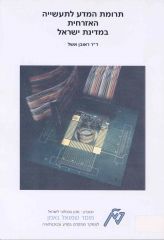
The Israel Academy of Sciences and Humanities initiated a series of seminars on the contributions of science to the State of Israel on its 50th anniversary. In this framework Technion President Professor Zehev Tadmor commissioned this survey which is dedicated to the contributions of science to Industry, and which serves to complement a previous survey […]
Economic Incentives in Solid Urban Waste Policy. Final Report
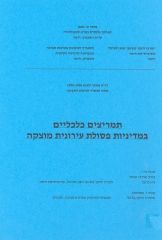
Disposal of municipal solid waste entails severe environmental burdens especially on small, densely populated regions and countries. Israel is grappling with the task of designing an efficient (and politically acceptable!) solid-waste policy, taking into consideration externalities associated with alternative disposal options and the pervasive NIMBY (Not In My Back Yard) syndrome.This paper analyzes alternative waste […]
Technometric Benchmarking: Towards an Interactive Operational Model for Management of Technology and Innovation in Science-Based Startups, Selected Re
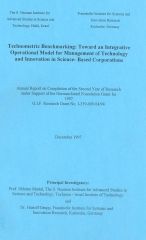
Overall objective of our project: “…to equip managers of technology in science-based companies [in Israel and in Germany] with tools that can help their firms become more innovative and competitive”. (from our Research Proposal). In this project, we are developing an integrated “toolkit” of quantitative benchmarking models, covering each aspect of the innovation process from […]
The Chemical Industry 2000 Potential for Future Growth
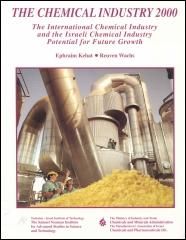
Chemical industry has been stagnating for many years. Long term trends are analyzed. There exists a potential for growth.We have identified market segments that are growing faster than other segments of the chemical industry. These were presented in 3 groups of potential areas for growth for the Israeli chemical industry:1) Families of intermediate: Synthesis gas […]
